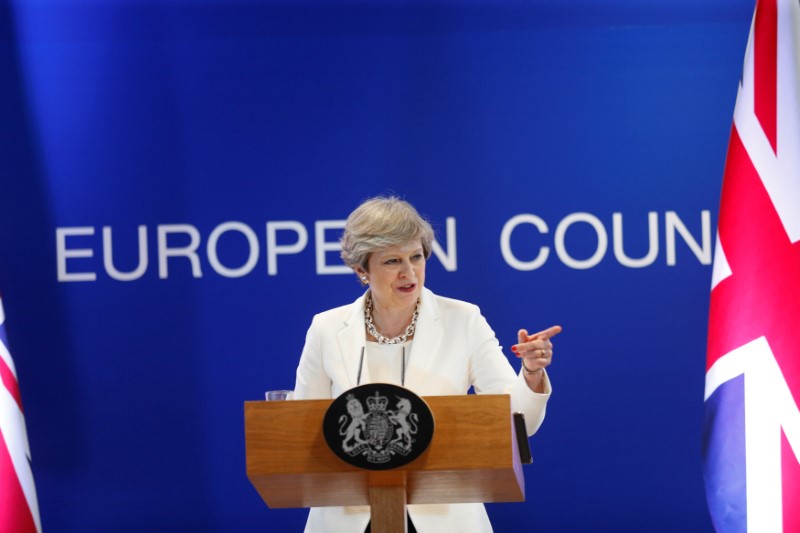By Alastair Macdonald and Elizabeth Piper
BRUSSELS (Reuters) - Prime Minister Theresa May defended her offer to let millions of EU citizens stay in Britain after Brexit as fellow EU leaders responded coolly on Friday to her opening move in negotiations on Britain's withdrawal.
A year to the day after Britons voted narrowly for Brexit, May admitted differences at the Brussels summit over guarantees to the 3 million EU expatriates in Britain, but said they would be addressed in negotiations begun this week.
German Chancellor Angela Merkel said it was a "good start" but "not a breakthrough, to say the least". Summit chair Donald Tusk, a former Polish premier, found it "below expectations" and said it could leave people, including 800,000 Poles, worse off.
"It's obvious that this is about reducing the citizens' rights," Tusk told reporters of his "first impression" of May's offer. "Our role in negotiations is to reduce this risk."
May, facing the first European test of her authority after an election backfire cost her a parliamentary majority, pushed back, calling her proposal a "fair and serious offer".
"Those citizens from EU countries that have come to the United Kingdom and who've made their lives and homes in the United Kingdom will be able to stay, and we will guarantee their rights in the United Kingdom," she said.
"There are some differences between that and the proposals of the European Commission, but the matter will now go into the negotiations."
Sitting alongside new French President Emmanuel Macron at joint news conference, Merkel said: "It became clear during the discussion last night that we have a long path ahead of us.
"And the 27, especially Germany and France, will be well prepared, we will not allow ourselves to be divided."
Many leaders want to see details that May promised for Monday, including the nitty-gritty of how complex, multinational families would fare and what judicial oversight there would be.
Belgian Prime Minister Charles Michel was among the most sceptical, wary of getting a nasty "cat-in-the-bag" surprise.
For Poland, Deputy Foreign Minister Konrad Szymanski said: "We appreciate the effort but the offer does not meet all the criteria the EU agreed on as red lines."
JUDGES' ROLE
In particular, the EU 27 want their citizens to be able to enforce their rights in Britain through the European Court of Justice, something May has ruled out. They also dispute her attempt to potentially limit those rights to people already living in Britain before she triggered Brexit three months ago.
EU chief executive Jean-Claude Juncker said he could not imagine people not having recourse to the European Court of Justice. The Union wants the ECJ to be the arbiter of the Brexit treaty. That would mean Luxembourg judges retaining a role in the lives of EU expatriates in Britain -- as now, via British courts.
At the end of a Brussels summit dinner on Thursday, May had outlined five principles. These were notably that no EU citizen resident in Britain at a cut-off date would be deported and that those who had lived in Britain for five years could stay for life -- a right foreigners already have in the rest of the EU.
Those more recently arrived would be allowed to stay until they reach the five-year threshold for "settled status". Red tape for permanent residency would be cut and there would be a two-year grace period to avoid "cliff edge" mishaps.
Nonetheless, some EU migrants to Britain still believed they would be required to leave.
"I don't feel safe with (May's offer) because I haven't been living here for five years. She hasn't been clear enough for me," said 26-year-old Italian cafe worker Michele Paoletti.
Paoletti, who moved to Britain in 2014, now intends to move to the Netherlands with his Dutch wife and son.
Weakened by an election she did not need to call, May has watered down her government's programme to try to get it through parliament and set a softer tone in her approach to Brexit, which she had opposed prior to last year's referendum.
Yet her aims have held. She wants a clean break from the bloc, leaving the lucrative single market and customs union and so reducing immigration and ending EU courts' jurisdiction.
However, her political weakness have generated concern that the divorce may not be orderly. Manfred Weber, German leader of conservatives in the European Parliament which must approve any Brexit deal, said the lack of detail in May's rights proposals was "quite worrying for the rest of the negotiations".

Describing "an island in chaos" compared to a continent growing in confidence in its economy and leaders like Macron, Weber said: "It still seems that the UK government has no idea what they want to achieve."